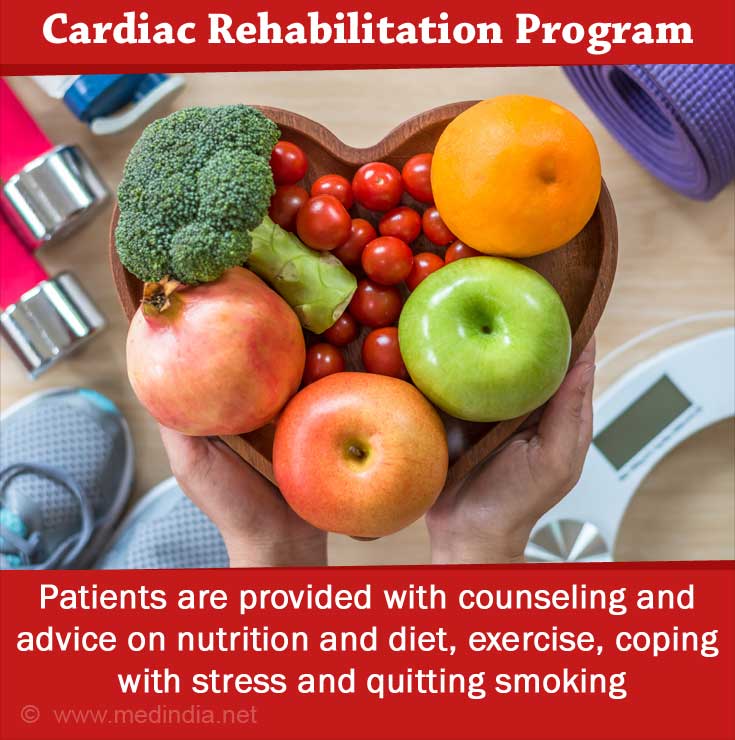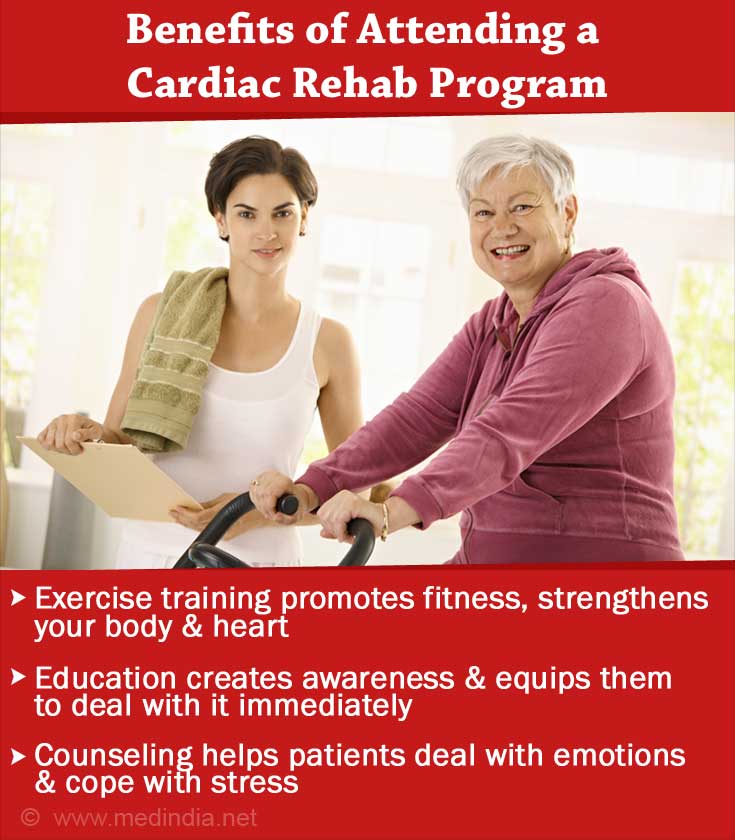- Cardiac Rehabilitation - (https://www.nhlbi.nih.gov/health/health-topics/topics/rehab)
- What is Cardiac Rehabilitation? - (http://www.heart.org/heartorg/conditions/more/cardiacrehab/what-is-cardiac-rehabilitation_ucm_307049_article.jsp)
What is Cardiac Rehabilitation?
Cardiac rehabilitation, as the name suggests, is a rehabilitative program designed to help anyone affected with cardiac or heart disease. It comprises of a medically supervised plan to bring about improvements in the quality of life and wellbeing of cardiac patients who have suffered any kind of heart disease, whether angina or a heart attack. The aim of cardiac rehabilitation programs is not to simply overcome and survive the condition, but to improve the patient’s health to the extent that the patient can lead a completely normal and active lifestyle. Cardiac rehabilitation uses a combination of various methods to achieve its goals, including exercise training, dietary advice, providing education, increasing awareness about healthy living and also providing emotional support and counseling to counter stress and depression.
Cardiac rehabilitation usually begins while you are still in hospital undergoing treatment for your heart condition or soon after being discharged. You can even seek cardiac rehabilitation after being discharged at any point of time you desire. Cardiac rehabilitation doesn’t involve a single cardiac rehabilitation specialist but is conducted by an interdisciplinary team of specialists that could include your family physician, cardiologist or heart specialist, surgeon, nutritionist, counselors and other health professionals. This involves a long term commitment and you should make it a point to get any concerns and doubts that you may have, addressed at the outset.
Recovery after any cardiac episode can vary greatly and is also determined by various factors, like your age, general health and the presence of any other health conditions that could interfere with treatment and recovery. Younger adults who do not suffer from any other health complications are obviously likely to experience much faster recovery as compared to an aged person, who has various health complications.
What are Different Cardiac Rehabilitation Programs Available?
Cardiac rehabilitation comprises of several phases, with progression through the phases varying for different cardiac patients. While some may stay in the same phase from start to finish, others may progress through different phases and some may even move back and forth. There is no predetermined optimal period of time during which you need to complete a particular phase or move into another.
The four phases of cardiac rehab include the following:
Phase I of rehabilitation begins while the patient is still in the hospital and involves non-strenuous activities to improve the patient’s ability to perform simple everyday tasks. The exercises typically include sitting up in bed, range-of-motion exercises and mundane activities that you would need to perform once you get back home like shaving or combing your hair.
Phase II is usually conducted in an outpatient setting, soon after you leave the hospital. This phase is very structured and is conducted in rehabilitation centers under strict medical supervision and monitoring. Patients are provided with counseling and advice on nutrition and diet, coping with stress and quitting smoking. Motivating patients to begin exercising is obviously the main focus in rehabilitation and patients are provided with instructions on exercise routines and activities that they can safely engage in, at home.

Phase III, like the previous phases is closely supervised, but there is no monitoring with telemetry monitors although these sessions are also conducted at the rehab center. Patients are instead taught to monitor their own heart rate and blood pressure. The duration of rehabilitation in this phase can vary depending obviously on the progress of each patient and also depending on each patient’s requirements. As patient’s start to get more independent, the exercises are also modified to improve flexibility and will even include strengthening aerobic exercises.
Phase IV is the final phase of cardiac rehabilitation, in which the patient is independent and rehabilitation is not about recovery but is instead a lifelong maintenance program. This phase is focused to ensure optimal health of the patient and to reduce the risk of any recurrence of the heart condition that landed you in hospital to begin with. Patients who have gone through all of the phases should have considerable knowledge on all of the skills and strategies required to maintain optimal health.
Services Offered in Cardiac Rehabilitation Programs
Cardiac rehabilitation programs include a variety of services, all of which are essential to achieve the goals.
- A thorough medical evaluation to formulate an appropriate rehabilitation program based on the specific requirements and limitations of the patient.
- A customized physical training program, which is the main component of rehabilitation. Typically, instruction will be provided by a physical therapist, exercise physiologist along with other health care specialists who are part of the cardiac rehabilitation team.
- Provisions to ensure the psychological wellbeing are also important to the entire rehabilitation program and there are counselors and psychologists on the team as well. They will help you cope with various emotional and stress related disorders.
- Nutritionists will make sure that you understand the basics of a heart healthy diet and will help you come up with specialized diet plans to ensure optimal health. The knowledge you gain from them will help you make healthy lifestyle choices for years to come.
Who Requires a Cardiac Rehabilitation Program?
A cardiac rehab program would be beneficial to anyone who has suffered any kind of heart disease and to some extent also those who are at a high risk of suffering from heart disease. If you have undergone any of these procedures or experienced any of these conditions you should consider joining a cardiac rehab program:
- Heart attack
- Heart and blood vessel diseases like coronary artery disease, angina, arteriosclerosis or hypertension.
- Heart procedures like surgery, bypass, angioplasty, stenting, valve replacement or implantation of cardioverter defibrillator or a pacemaker.
What are the Benefits of Attending a Cardiac Rehab Program?
A cardiac rehabilitation program offers several health benefits to cardiac patients because of the various features that comprise such rehab programs. Patients receive the guidance and instruction from experts in various medical specialties thereby ensuring that patients are provided with a comprehensive plan for recovery.
- Exercise training in the program helps to promote fitness, strengthening your body and not just the heart. This part of the program helps to improve energy levels, making you fitter and healthier, greatly reducing your chance of suffering from heart problems in the future.
- Education and instruction help to make patients knowledgeable about their condition and equips them to deal with and address issues that concern them. With this knowledge and guidance, patients are able to make better informed decisions to improve their lifestyle with healthy eating habits, weight loss goals, and strategies to manage blood pressure and cholesterol levels.
- Counseling is often neglected when dealing with cardiac patients but it is an extremely important aspect of cardiac rehabilitation. Disillusionment and depression or fear are natural emotions after undergoing any life-threatening experience and heart patients need some amount of reassurance. Patients tend to feel better and are better able to cope with stress when they receive counseling.

The most striking benefit that ultimately derives from all of the other benefits is that the patient soon starts to return to a healthy active lifestyle, very often even healthier and a lot more active and fulfilling than before the heart episode.







